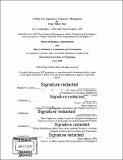A multi-axis approach to complexity management
Author(s)
Blok, Paige Mahler
DownloadFull printable version (13.17Mb)
Other Contributors
Leaders for Global Operations Program.
Advisor
Olivier L. de Weck and Thomas Roemer.
Terms of use
Metadata
Show full item recordAbstract
A high degree of complexity exists in the product, processes, organization and supply chain at HIGHVOLT Prüftechnik GmbH, subsidiary of Maschinenfabrik Reinhausen. The current state complexity results from unique market dynamics, the highly technical nature of the solutions offered and customer demands for vast customization. Paramount strategic goals of the company are to reduce delivery time, decrease cost and mitigate risk. The focus of this project is to achieve these strategic goals through complexity management. We hypothesize that by beginning at a high-level collection of process, product and organizational complexity information, we can achieve a highly effective method for managing the complexity in the system. This project uses two primary diagnostic analysis techniques: thorough core process flow mapping and pain-point data collection from critical stakeholders. Synthesis of the process flow mapping and pain-point data reveals high complexity challenge areas. Specific problematic components and subsystems are also illuminated and subsequently evaluated for management, including modularization feasibility investigation and supply chain analysis. A case study is conducted on high-voltage capacitors, which were revealed by the investigatory process as a critical complexity and risk driver. This study validates the methodology and provides actionable recommendations to executive leadership, enabling progress towards strategic goals. These recommendations include employing a modularization strategy to a portion of the product portfolio in order to influence supply chain dynamics to increase HIGHVOLT's influence and autonomy. Results of this project include identification of thirteen critical high-impact areas with recommendations for further action. Specific high-risk drivers are also highlighted; particularly, reliance upon single-source suppliers. A deep investigation to alleviate the single source supply issue for high-voltage capacitors results in a novel technical solution that increases modularization to reduce variants in the product portfolio while maintaining essential flexibility and improving HIGHVOLT's supply chain dynamics.
Description
Thesis: M.B.A., Massachusetts Institute of Technology, Sloan School of Management, in conjunction with the Leaders for Global Operations Program at MIT, 2018. Thesis: S.M., Massachusetts Institute of Technology, Department of Aeronautics and Astronautics, in conjunction with the Leaders for Global Operations Program at MIT, 2018. Cataloged from PDF version of thesis. Includes bibliographical references (pages 82-83).
Date issued
2018Department
Leaders for Global Operations Program at MIT; Massachusetts Institute of Technology. Department of Aeronautics and Astronautics; Sloan School of ManagementPublisher
Massachusetts Institute of Technology
Keywords
Sloan School of Management., Aeronautics and Astronautics., Leaders for Global Operations Program.